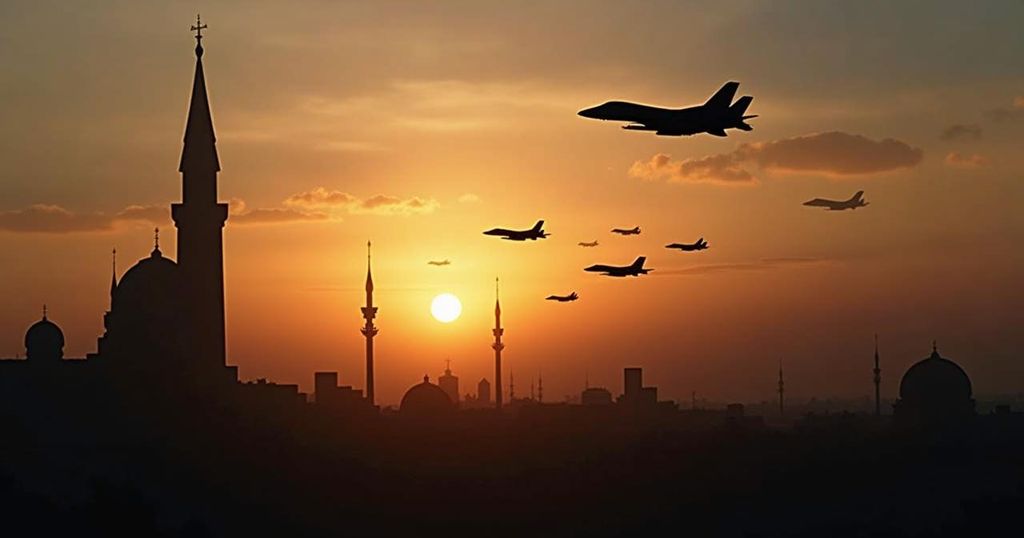The Egyptian airspace continues to function normally despite the recent Iranian missile attacks on Israel, assuring traveler safety. Coordination with neighboring nations is underway due to airspace closures in Jordan and Iran. Israel has faced significant conflict following these attacks, leading to international calls for ceasefires.
On October 2, 2024, the Egyptian Ministry of Civil Aviation confirmed that Egyptian airspace remains secure and operates normally in the wake of a significant missile attack by Iran on Israel. The statement reassured travelers that the airspace is functioning under the highest safety standards, with regular air traffic continuing. The ministry noted that there has been coordination with neighboring countries as both Jordan and Iran closed their airspace following the attacks. Notably, EgyptAir flight MS 701, which was scheduled to fly from Cairo to Amman, had to return to Cairo International Airport due to Jordan’s airspace closure. EgyptAir and Cairo International Airport’s public relations teams have been assisting affected passengers. Additionally, Cairo International Airport is on high alert for potential aircraft diversions from closed airspaces in adjacent nations. The Ministry has urged travelers to Baghdad, Erbil, and Jordan to verify their flight reservations and reassured them of ongoing updates regarding the situation. On that same day, Iran executed an extensive missile strike, launching nearly 200 missiles targeting Israeli military installations. This marked Iran’s most considerable offensive against Israel, roughly double the scale of a missile attack conducted in April. The Islamic Revolutionary Guards Corps (IRGC) stated that this assault was retaliation for the recent Israeli assassination of Hezbollah leader Hassan Nasrallah and Hamas political leader Ismail Haniyeh in prior incidents. Amidst this escalating violence, Israel has reported around 1,900 deaths and over 9,000 injuries due to conflicts between Israeli forces and Hezbollah, especially in light of recent ongoing airstrikes and a ground offensive in southern Lebanon. As the humanitarian crisis worsens in Gaza, Egypt, along with various global leaders and the United Nations, has called for an immediate ceasefire to diminish unrest in the Middle East. Despite international calls for de-escalation, Israel has continued its military actions against entities in Gaza, Lebanon, and Yemen, raising fears of a broader conflict. In response to Iran’s missile attack, Israeli Prime Minister Benjamin Netanyahu pledged a vigorous retaliation. The Israeli Ambassador to the United Nations, Danny Danon, warned that “Iran will soon feel the consequences of their actions. The response will be painful.” Following Iran’s missile launch, the White House echoed sentiments of severe repercussions for Iran, with spokesperson Jake Sullivan indicating a cooperative effort with Israel to ensure this result. The Israeli military claimed that most of the missiles were intercepted by Israeli defenses and a coalition led by the United States. The IRGC further indicated that they utilized hypersonic Fattah missiles in the attack, achieving a 90% hit rate on Israeli targets. Iran’s Foreign Minister stated that any further provocations from Israel would result in a “stronger and more powerful” response.
The article discusses the secure status of Egyptian airspace amidst escalating military tensions between Iran and Israel. It explores the impact of Iran’s missile strike on Israel, the operational status of aviation within Egypt, and the broader geopolitical landscape surrounding the conflict, particularly recent military actions and retaliations occurring in the region. The escalating violence has created a humanitarian crisis, prompting international calls for ceasefires and diplomatic intervention, highlighting the urgent need to address ongoing conflicts affecting numerous nations, including Gaza, Lebanon, and Yemen.
In conclusion, while Egyptian airspace operates normally despite the regional tensions, the conflict between Iran and Israel poses significant risks and challenges for neighboring countries. The recent missile attacks by Iran represent a significant escalation in violence and have prompted dire humanitarian implications. The situation remains fluid, with ongoing calls for diplomatic resolutions and ceasefires as global leaders seek to mitigate further conflict.
Original Source: www.egypttoday.com






